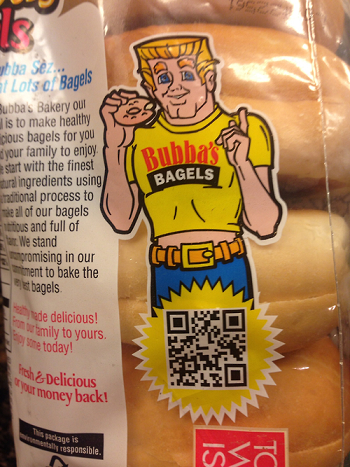 I think there is a use in B2B marketing for QR codes. The problem is they are often poorly implemented.
I think there is a use in B2B marketing for QR codes. The problem is they are often poorly implemented.
“The QR Code (abbreviated from Quick Response Code) is the trademark for a type of matrix barcode (or two-dimensional code) first designed for the automotive industry to allow components to be scanned at high speed. More recently, the system has become popular outside the industry due to its fast readability and large storage capacity compared to standard UPC barcodes.”
From Wikipedia, the free encyclopedia
I get QR codes in real estate or retail. You’re walking along, window shopping, and, although the store is closed, perhaps you can scan its QR code and look at their website, perhaps get a price for something you see in the window. Or, you pass a house for sale and, as usual, the flyers are all gone. If there is a QR code on the For Sale sign, you can scan it and see the listing details, including price.
But what’s the value in B2B marketing? When you pass out one sheets or brochures at a meeting or at a presentation you give, most include your website URL so that those who are interested can go to your website and get more information. A QR code on the one sheet or brochure can help them get to the site quicker, without keying in a (sometimes) long URL. Ideally, you would use a QR code to quickly connect your audience to a landing page on your site with a special offer.
The problem that I’ve seen in B2B marketing is that the QR codes often link to a Home page instead of the page with specific product or service information. They just don’t fulfill what they promise, not because of what they are, but because people don’t know how to use them (connect to a special offer on a special landing page) or they don’t test them (they set up the special offer and landing page but the code goes to the wrong URL).
In researching this blog post, I came across some interesting information. An article in Businessweek in June 2012, QR Code Fatigue, mentions that in 2011 only 5% of Americans scanned a QR code in 2011. Marketers began backing off the use of QR codes because they just didn’t get much traction.
A Forbes article in August 2012, Why QR Codes Don’t Work, makes a great point, that QR codes must link to a webpage optimized for mobile phones, since that is what is used to view the page! Great point – otherwise your viewer could be hampered by cumbersome scrolling to get to the information they expect to easily see. Finally, check out the blog WTF QR Codes, mentioned in the Businessweek article. It is a humorous look at some very poor implementations of QR codes.
So, what began as a productivity tool in the automotive industry is proving difficult to implement for many. I still think there is hope – in my opinion QR codes have some use and will be used more and more in marketing.








